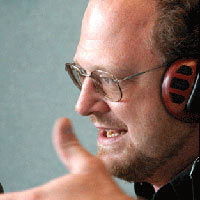Joe Klein appears to be the candidate for the spring elections that just can't get any respect. The computer consultant and just-returned-from-Iraq Army reserve member is the only declared candidate to run against Scott Walker for Milwaukee County Executive.
But, no major media seems to notice.
In a poll last week of its online readers, The Business Journal of Greater Milwaukee asked its readers who their preference was for Exec, listing only Walker and state Sen. Lena Taylor. Taylor has yet to officially get off the fence. The more she waits, the harder it will be for her campaign to gain momentum. The North Side Democrat faces serious problems getting any alternative message heard in the suburbs, where voters love Walker's no-tax increase pledges despite the effect on the City of Milwaukee. It's really too late in the game for anyone but Bill Clinton to have a chance of beating Walker.
But Klein is mounting an offensive via e-mail and the Internet anyway. He's started a weekly broadcast outlining his views on how the county should be run. Although lengthy, they do have substance and decent rhetoric.
"Scott Walker's political allies have given up trying to solve the problems of poverty, low employment and poor education in our community. Milwaukee County government is overburdened with the human fallout from our inability to face our social problems. Many in our community have lost hope and the belief in progress toward a better tomorrow," he writes in a campaign declaration.
"The politics of Scott Walker and his political allies are the politics of division and decline. Scott Walker's thoughtless dedication to the single-minded message of "no new taxes" masks human misery behind sound bites. His budget cuts, more often than not, hurt the disenfranchised and the powerless and diminish the assets bequeathed to us by our progressive forebears."
This week's missive declares a commitment to better information access on the county's Web site, which is woefully thin on allowing citizens to find out details of what's going on. While agendas are online, no information regarding the items being considered is accessible and minutes of meetings often aren't posted for a month. And there are no broadcast offerings of county committee meetings, meaning issues like the infamous pension scandals can't be predicted or prevented by the good citizens of Milwaukee County.
Klein also humorously notes the chances of his victory by including Picasso's drawing of Don Quixote on his Web site, www.joeklein.org.
Class Battle at the Library: One seemingly minor item in Milwaukee Mayor Tom Barrett's proposed budget that's causing early furor is a change in how city libraries handle CD and DVD rentals.
Right now, people can reserve movies and music online or in advance without having to go to the library. That gives the edge in reserving the latest home entertainment to folks who play on computers at work or can afford them at home.
Of course, if those folks decide not to pick up their order, that means many others who lack technology or just want to browse are left out of the opportunity. Barrett's plan is to cut the reserve service out and make people go to the library to pick up what's available. But the grousing has already started on a few community chat groups, whose participants forget that some are underprivileged when it comes to computer access.
As Barrett notes, people should not expect better service from the public library than that offered by rental stores. It adds sort of an egalitarian flavor to his budget argument. After all, everyone pays for the library service and access should be the same for everyone. It's sort of an old-school Milwaukee Socialist argument.
However, it does run counter to past Barrett tinkering with the library budget. He canned the popular Bookmobile last year, which was a key to getting library stock to underserved areas of the city, mainly on the West Side. He also cut hours at all the libraries and at one time tried to close a popular North Side branch. The community rallied to point out what an important asset libraries are to our neighborhoods.
Let's Break a Deal: Part of the agreement expanding the Milwaukee school voucher program --which gives public funds to religious and parochial schools for low-income students -- was that participating schools submit standardized test scores. Unlike their public counterparts, private schools aren't normally required to have standardized tests and aren't subject to much oversight at all. Because they aren't used to such oversight, schools aren't sending test scores out.
State Sen. Russ Decker is asking the Legislature's Audit Bureau why. The Wausau Democrat is wondering why the LAB reported that the scores would be over a year late.
"Wisconsin taxpayers will shell out $246 million for the voucher program over the next two years and they deserve to know how these schools are performing," Decker says.
One other question that Decker's inquiry raises is why Milwaukee-area lawmakers aren't asking the same questions.
A Darling of a Cruiser: Alberta Darling, our favorite River Hills Republican who doesn't miss a chance at headline-grabbing legislation, has sauntered in to the cruising controversy in Milwaukee.
Under the label "Crackdown on cruising," Darling seems to know all about why the streets are lined with cars filled with young people with nothing to do on weekends. Darling's bill would allow police to tow any car stuck in the traffic jam instead of just the ones at the front of the line, which ostensibly caused traffic to stop in the first place. The argument raises constitutional questions in terms of Fourth Amendment issues. While cruising is a pain in the ass for people who live along the streets where it happens, it results in numerous arrests for the cops, especially in the area of outstanding warrants.
Fever Pitch: Global warming has come to Wisconsin. That's the word from Clean Wisconsin, the state's leading environmental advocacy group (although we have yet to rank the state's leading anti-environmental advocacy group).
Clean Wisconsin suggests that the weather extremes in western Wisconsin, which went from being labeled as an extreme drought-stricken area to a federal disaster area after major flooding in August, is a result of global warming. In its report, "Global Warming Arrives in Wisconsin," the group portends the future of the Badger state under the phenomenon.
What should we expect?
A major drop in Great Lakes water levels, costing the shipping industry and ports millions of dollars.
Loss of half or more of inland cold-water trout habitat.
Crop losses due to drought and pests, and heat stress on animals will threaten family farm income.
Reduction of the boreal forests of the Up North region of the state.
More mosquitoes and ticks.
Loss in winter tourism income because the ice on the lakes would be unsafe for fishermen and snowmobilers.
See www.cleanwisconsin.org for more on the state's global warming future.
An avid outdoors person he regularly takes extended paddling trips in the wilderness, preferring the hinterlands of northern Canada and Alaska. After a bet with a bunch of sailors, he paddled across Lake Michigan in a canoe.
He lives in Bay View.



